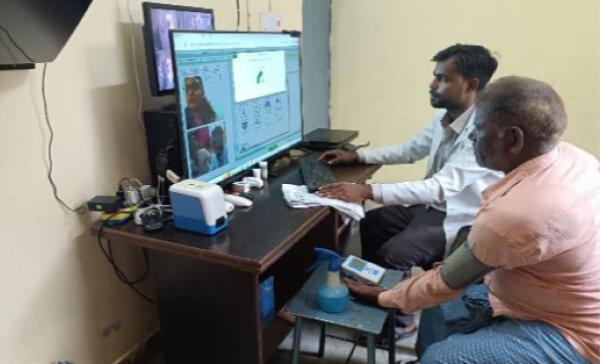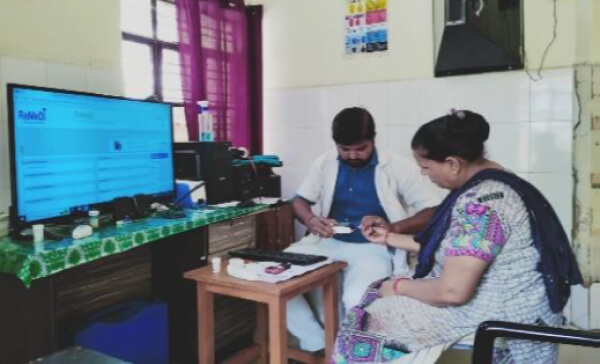March 21, 2024
Social enterprises with innovative healthcare solutions are playing a pivotal role in addressing India’s unique healthcare challenges of accessibility, affordability, and quality. Neurosynaptic Communication is one such enterprise that enables access to quality and affordable healthcare, especially in underserved regions, through technological innovation. The enterprise is committed to enabling healthcare access through digital health and telemedicine solutions.
Neurosynaptic has developed a range of innovative solutions, including the ReMeDi Telemedicine Platform to provide end-to-end telemedicine services, and ReMeDi NOVA Kit – a portable kit that provides a broad range of point-of-care diagnostics with 40 tests and a common interface for various healthcare solutions. The products are designed to focus on screening, triaging, and providing medical consultations, offering point-of-care services through telemedicine clinics, while maintaining comprehensive digital patient data. These innovative solutions are instrumental in delivering quality and affordable medical care to rural areas, where traditional healthcare services were inaccessible.
Despite its impactful innovations, Neurosynaptic faced challenges in scaling its solutions in rural areas, particularly due to lack of availability of appropriate financial options. The SAMRIDH Blended Finance Facility, supported by USAID and implemented by IPE Global, played an important role in addressing these challenges. SAMRIDH provided financial assistance to Neurosynaptic through its grant and returnable grant instruments in the form of working capital for operating telemedicine centers, production of devices, technology enhancement, and other operational expenses. This assistance enabled the organization to operationalize 10 telemedicine centers and extend its services to additional 20 centers across Maharashtra, Karnataka and Uttar Pradesh. The impact of this support was profound. Neurosynaptic achieved an impressive average growth of about 60% year-over-year for two consecutive years, showcasing financial sustainability and paving the way for 95% average year-over-year growth for the next three years.
 Munnu Lal getting treatment and consultation at Neurosynaptic Communication’s telemedicine center in Bhamnakheda village, Uttar Pradesh
The impact of Neurosynaptic’s innovative solutions is best seen through the change they brought to people’s lives. For instance, Munnu Lal from Bhamnakheda village in Hardoi of Uttar Pradesh, whose life was a daily struggle with excruciating knee pain and a lack of access to medical facilities. Through teleconsultations, Munnu Lal received expert medical advice and personalized medication that eventually cured his debilitating condition. The entire village benefited from this initiative, with free medicines and accessible healthcare creating widespread well-being.
Munnu Lal getting treatment and consultation at Neurosynaptic Communication’s telemedicine center in Bhamnakheda village, Uttar Pradesh
The impact of Neurosynaptic’s innovative solutions is best seen through the change they brought to people’s lives. For instance, Munnu Lal from Bhamnakheda village in Hardoi of Uttar Pradesh, whose life was a daily struggle with excruciating knee pain and a lack of access to medical facilities. Through teleconsultations, Munnu Lal received expert medical advice and personalized medication that eventually cured his debilitating condition. The entire village benefited from this initiative, with free medicines and accessible healthcare creating widespread well-being.
 Mrs. Tapeshwari remotely consulting a doctor from a Neurosynaptic telemedicine center in Beniganj
Mrs. Tapeshwari remotely consulting a doctor from a Neurosynaptic telemedicine center in Beniganj
Similarly, Mrs. Tapeshwari, a resident of village Beniganj, Kotawan (Hardoi) in Uttar Pradesh, had been suffering from a persistent skin condition (eczema) for several years, finding no relief from various private hospitals. Her life changed when she discovered the telemedicine center by Neurosynaptic Communications in Beniganj. Following a series of consultations and diligent adherence to the treatment plan, she found complete relief from her chronic condition. Through telemedicine, Mrs. Tapeshwari was able to access convenient, cost-effective, and personalized care. It saved her the time and effort of traveling to far-off private hospitals.
Stories like Munnu Lal’s and Mrs. Tapeshwari’s exemplify the transformative potential of social enterprises in providing healthcare services to remote locations. Leveraging blended finance through SAMRIDH not only catalyzed Neurosynaptic’s growth but also allowed it to scale up its solution and make better health an accessible, convenient, and affordable reality for people from all strata of society.
Neurosynaptic’s success extends beyond business growth. It exemplifies the transformative potential of social enterprises in providing healthcare to remote locations. By leveraging blended finance through SAMRIDH, Neurosynaptic not only catalyzed its growth but also made quality healthcare accessible, convenient, and affordable for all. Through its innovative solutions and unwavering commitment, Neurosynaptic continues to be a beacon of hope for millions in India’s rural and remote areas, fortifying healthcare systems and changing lives.
Neurosynaptic has developed a range of innovative solutions, including the ReMeDi Telemedicine Platform to provide end-to-end telemedicine services, and ReMeDi NOVA Kit – a portable kit that provides a broad range of point-of-care diagnostics with 40 tests and a common interface for various healthcare solutions. The products are designed to focus on screening, triaging, and providing medical consultations, offering point-of-care services through telemedicine clinics, while maintaining comprehensive digital patient data. These innovative solutions are instrumental in delivering quality and affordable medical care to rural areas, where traditional healthcare services were inaccessible.
Despite its impactful innovations, Neurosynaptic faced challenges in scaling its solutions in rural areas, particularly due to lack of availability of appropriate financial options. The SAMRIDH Blended Finance Facility, supported by USAID and implemented by IPE Global, played an important role in addressing these challenges. SAMRIDH provided financial assistance to Neurosynaptic through its grant and returnable grant instruments in the form of working capital for operating telemedicine centers, production of devices, technology enhancement, and other operational expenses. This assistance enabled the organization to operationalize 10 telemedicine centers and extend its services to additional 20 centers across Maharashtra, Karnataka and Uttar Pradesh. The impact of this support was profound. Neurosynaptic achieved an impressive average growth of about 60% year-over-year for two consecutive years, showcasing financial sustainability and paving the way for 95% average year-over-year growth for the next three years.
 Munnu Lal getting treatment and consultation at Neurosynaptic Communication’s telemedicine center in Bhamnakheda village, Uttar Pradesh
Munnu Lal getting treatment and consultation at Neurosynaptic Communication’s telemedicine center in Bhamnakheda village, Uttar Pradesh Mrs. Tapeshwari remotely consulting a doctor from a Neurosynaptic telemedicine center in Beniganj
Mrs. Tapeshwari remotely consulting a doctor from a Neurosynaptic telemedicine center in BeniganjSimilarly, Mrs. Tapeshwari, a resident of village Beniganj, Kotawan (Hardoi) in Uttar Pradesh, had been suffering from a persistent skin condition (eczema) for several years, finding no relief from various private hospitals. Her life changed when she discovered the telemedicine center by Neurosynaptic Communications in Beniganj. Following a series of consultations and diligent adherence to the treatment plan, she found complete relief from her chronic condition. Through telemedicine, Mrs. Tapeshwari was able to access convenient, cost-effective, and personalized care. It saved her the time and effort of traveling to far-off private hospitals.
Stories like Munnu Lal’s and Mrs. Tapeshwari’s exemplify the transformative potential of social enterprises in providing healthcare services to remote locations. Leveraging blended finance through SAMRIDH not only catalyzed Neurosynaptic’s growth but also allowed it to scale up its solution and make better health an accessible, convenient, and affordable reality for people from all strata of society.
Neurosynaptic’s success extends beyond business growth. It exemplifies the transformative potential of social enterprises in providing healthcare to remote locations. By leveraging blended finance through SAMRIDH, Neurosynaptic not only catalyzed its growth but also made quality healthcare accessible, convenient, and affordable for all. Through its innovative solutions and unwavering commitment, Neurosynaptic continues to be a beacon of hope for millions in India’s rural and remote areas, fortifying healthcare systems and changing lives.

